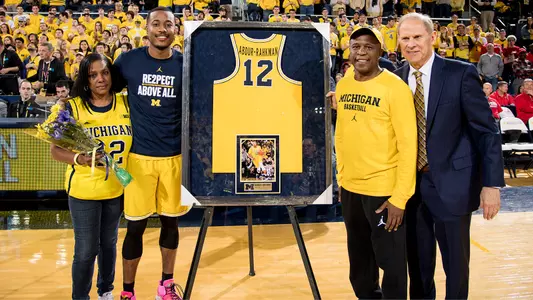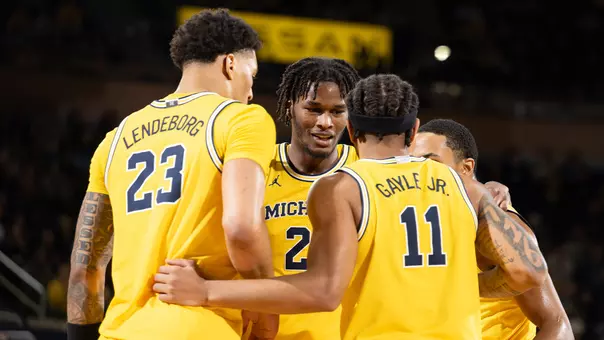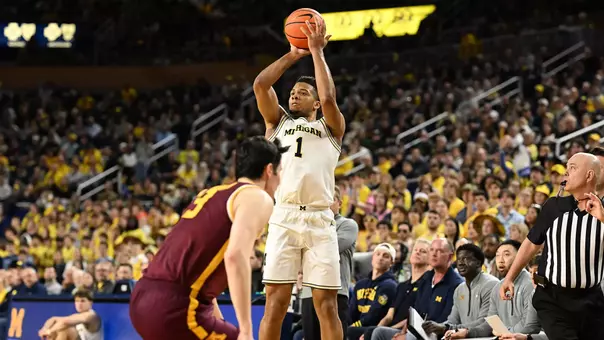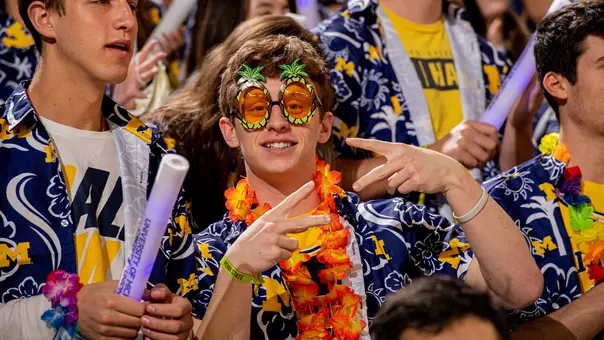
Kornacki: How Muhammad-Ali Abdur-Rahkman Got His Name and Got His Game
3/16/2018 11:44:00 PM | Men's Basketball, Features
By Steve Kornacki
WICHITA, Kan. -- Muhammad-Ali Abdur-Rahkman has made quite a name for himself. He was selected for the five-man all-tournament team after helping lead the University of Michigan men's basketball team to the Big Ten Tournament championship, ranks second in the nation in assist-to-turnover ratio, plays clamp-down defense and averages 12.6 points per game.
The senior tri-captain from Allentown, Pennsylvania, also has quite a name.
His father, Dawud, decided to name his third child after the boxing legend he once met and shook hands with at his training camp in Deer Lake, Pennsylvania. Ali, known simply as "The Greatest," provided his namesake quite a billing to live up to.
"The name means a lot to me," said Muhammad-Ali. "He's one of my role models. Even though I didn't grow up during the time of his career, I knew what he stood for. I'm so glad that I'm named after him. I mean, it pulls weight."
Dawud (dah-wooed), the head basketball coach at Lehigh Carbon Community College in Schnecksville, Pennsylvania, said, "When my third child was born, I knew I had to do something special. I don't know if it was an epiphany or a vision, but I said, 'This one is going to be Muhammad-Ali, with a hyphen.' Everyone was so happy and excited.
"It's a tribute to Ali. It's a tribute to my son. It's a tribute to me and what I feel is important. He wasn't a perfect man by any means -- none of us are. But his genuine concern for others and who he was stood up here (raising his hand above his head) at a time when people would not dare to say what he was saying.
"As a child growing up in the late '60s and early '70s, Muhammad Ali was among other African-American sports figures I admired, but he was my favorite. I was the child of a single parent, a mother, and there were very few examples of African-American men who were strong and tough. He was that man. I was enamored with him."
Then Dawud got to meet him 40 years ago.
"I was coming home on leave after joining the Army," he recalled. "At the time, my sister's boyfriend was a boxer and an artist. He had drawn a pastel rendition of the famous Sports Illustrated cover photo of Ali and (Joe) Frazier (in one of their three classic fights)."
One thing led to another, and it was arranged for the artist to present the painting to Ali at Deer Lake in 1978. Dawud, along with friends and family members and several youths from their local recreation center, arrived at a cabin where Ali put on a show while sparring and exhibiting his classic flamboyance. The artist, Glen Kocher, was allowed to take one friend to meet Ali for the painting presentation.
"Guess who he picked?" said Dawud. "Me! I said, 'How are you doing, champ?' I shook his hand, and I'll never forget how powerful it was. I was mesmerized. A lot of what he said is a blur. But there are two things I remember: how genuine he was and how much he cared about people. He didn't have to do all this for us, and that just empowered my conviction to him.
"We left after a short while, and I was thrilled for the rest of my life."
Despite having a name that grabs your attention, Muhammad-Ali has not gained much notoriety. He was no better than All-Big Ten honorable mention this season, but has been front-and-center on a team headed to Saturday's (March 17) NCAA second-round game here against Houston. At least one opposing coach found that to be perplexing.
"The one guy that I've been incredibly impressed with this year has been Abdur-Rahkman," said Iowa coach Fran McCaffery before facing Michigan in the conference tourney opener. "And nobody talks about that kid. And he's one of the best players in our league.
"I thought he had as good a year as anybody in our league this year. I think [he's] one of the big reasons why they had the success they had, among a lot of other people. But he's a senior that has been through a lot and has been a really good player for them.
"I thought he was a star this year. I really did. But, again, they've got a lot of weapons. They've got depth. They've got speed. They've got size. So, they can downshift and go small."
Those comments were read to Muhammad-Ali, and he was asked why he's gained so little notice for doing so much.
"I think it's just my demeanor," said Muhammad-Ali. "I'm not real flashy. I just try to get the job done, and I think that goes unnoticed at times. But it's fine. I don't care. I don't need that. I just try to help my team win. And I've made strides this year in being more of a vocal leader.
"To the general public, I'm quiet and a shy guy. I'm more observant and always watch and see how people move and act. But once you get to know me, I'm pretty outgoing and talkative."
 Muhammad-Ali Abdur-Rahkman (center) said he learned much more than the X's and O's of basketball from his father, Dawud (right). "He taught me the game and how to carry myself. He always said, 'You don't know who's watching you.' And I took that to heart and tried to be the best person I could at all times."
Muhammad-Ali Abdur-Rahkman (center) said he learned much more than the X's and O's of basketball from his father, Dawud (right). "He taught me the game and how to carry myself. He always said, 'You don't know who's watching you.' And I took that to heart and tried to be the best person I could at all times."
Dawud and his son came up with a plan when the early signing date arrived during his senior season at Allentown Central Catholic High. Muhammad-Ali wasn't feeling good about accepting scholarships from mid-major schools because he felt he could play at the top level.
"I told him that if he was not too happy with his offers not to do something he didn't want to do or would regret," said Dawud. "I said, 'If you want to wait, I support you 150 percent.' And he said, 'Yes, that's what I want to do.'
Muhammad-Ali said, "I had a lot of mid-major and low-major offers. But I felt like I belonged at this level and was just waiting. I got a lot of late interest and Pitt was coming. Penn State was a little bit around and Boston College. But when Coach (Beilein) called my high school coach, I thought it was a joke. And then Coach B actually called me. I said, 'This is Coach B!' It was crazy. I'm so blessed to be in the position I am right now, and I wouldn't trade it for anything."
Muhammad-Ali started slowly, averaging 4.5 points with 27 assists to 28 turnovers and 13 starts as a freshman. But this season, he has 4.54 assists to offset each turnover.
"When you're a freshman, everything's fast, 100 mph," he said. "It's just been a matter of everything slowing down. I try to not make mistakes, but you make mistakes because the game is so fast. Now, it's so slow that I see everything, and I see things before they happen. It's maturity, and I owe it all to my experience. Now, I just try to put my teammates in position to be successful."
He's played in 139 games, ranking third in program history. He's scored 1,238 points, good for No. 35 at Michigan.
Dawud, who also coached at schools such as Howard University, Muhlenberg College and Penn State-Lehigh Valley, watched his oldest son, Shahad, score 1,075 points at East Stroudsburg. He honed his game as surely as he has that of Muhammad-Ali, who is 14 years younger than Shahad.
Muhammad-Ali said, "My mom and my dad are split, and so I would go visit my dad. So, I would go to Howard University (in Washington, D.C.) and always be around Dad. Basketball has been engrained in me. I listened to him talk to his players, and I have a data base that I can call upon in any situation. I'm lucky to be the son of a coach, especially a college coach.
"He taught me the game and how to carry myself. He always said, 'You don't know who's watching you.' And I took that to heart and tried to be the best person I could at all times. That's helped me a lot."
They would meet every Friday night, Saturday morning and Sunday morning for 90-minute to two-hour drills designed to test his dedication. Dawud said he taught his son to be a good teammate and to focus on winning rather than statistics, fundamentals and a way to navigate through challenges.
"That kid is just tough," said national TV analyst Bill Raftery. "He just knows how to play!"
Smash him in the nose with an elbow, and he barely blinks. Give him an inch of a crease, and he will turn it into a mile. Muhammad-Ali can take your best punch and beat you in so many ways.
"So," said Dawud, "in a strange way, his name always made him have to be better. It always made him have to stand above. It always made him stay above the low-class stuff, and he does!
"Sometimes there is a blessing in trying to do good and doing right by others."











